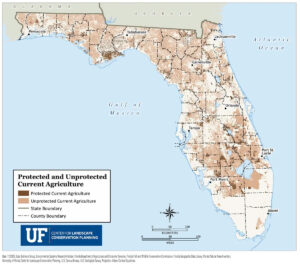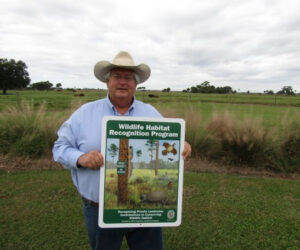Manatee County rancher advocates for ‘conservation easements’ and public funding.
By Johannes Werner
Original Air Date: Jan. 24, 2024
Host: Sea level rise and climate change are rarely mentioned in the official discourse of the state government in Florida. Nor does our government usually frame new construction as a problem or challenge. But agriculture in this state is under tremendous pressure, and reality is beginning to creep in. A webinar held today by an environmental group featured a Manatee County cattle rancher and highlighted University of Florida research about the future of agriculture in the state. Our news team listened in.
Johannes Werner: The University of Florida’s Center for Landscape Conservation Planning is researching the future of agriculture in the state, considering the two-fold challenge of climate change and population growth and the development that comes with it. The study lays out two scenarios – one a pessimistic one about pretty much unrestricted sprawl, and a more optimistic one that would include more enlightened land conservation and urban planning policies.

During a webinar hosted by 1000 Friends of Florida today, University of Florida researcher Michael Volk put it starkly: Given the importance of agricultural land as wildlife habitat, protector of clean water, buffer for increased flooding, and a source of food for a growing population, counties should stop – repeat, completely stop – any rezoning of agricultural land for new construction.
In our neck of the woods, the University of Florida maps show that little agricultural land is left in Sarasota County – most of it is actually about to be taken over by suburban sprawl. In Manatee County, agriculture is pretty much gone in the western half of the county, and it is shrinking in the eastern half. The maps show that there is some cropland in Manatee, but by far most of the agricultural land here is grazing land.
With his ranch in Manatee County, Jim Strickland is one of the biggest, if not the biggest, cattle rancher in this area. He also is a former head of the Florida Cattlemen Association. Strickland says that much of agriculture in Florida is “on life support.”
Jim Strickland: Mainly in these family agricultural operations, we don’t make a huge amount of money. There’s a reason why so many ranchers, timber, farmers sell out to developers. That we don’t make a lot of money, but also there’s only so many ways you can split … I’ll call it the “heritage pie.”
My great grandfather, great grandmother started something of which now we’ve got 40 or 50 heirs. Not everybody wants to be in agriculture. Not everybody wants to stay on the farm. Not everybody wants to saddle a horse at five o’clock in the morning and ride out into the rain because we still need to work those cows.
JW: He drives home the point that agriculture and conservation easements, and the funding for it, are key to the protection of agricultural land.
JS: Do a conservation easement, which of course is on everybody’s lips now across Florida. With the programs that they have at Florida Department of Environmental Protection called “Florida Forever,” which is a wonderful program with a great staff, knowledgeable staff, on doing conservation easements on ranch lands. It helps ranchers keep their ranch into productivity and give up their development rights for the betterment of society.

Manatee County Rancher Jim Strickland
Another one is Florida Department of Agriculture and Consumer Services with their rural family lands program. Similar, but a little different. Great personnel, great staff, science based, and they are, they have been overloaded, both these programs, with people wanting to do conservation easements. That’s why it’s so important to support these folks.
Another thing that you could help us with is cost share programs like USDA, FSA, NRCS, which work for conservation of ranch lands and it’s where the benefit of getting funding by these organizations to ranchers really benefit us, but they have decided through those programs, it’s also going to benefit the rest of society. If you want to help us, help us with a lot of our funding that will fund conservation easements. We are less than 2% of the population of Florida, which means y’all are 98%. If you’re not in agriculture, you’re 98%. Your political power, your votes that you bring to the table, are immeasurable. If we need your help, we could use it. You have the power to really help us. We are not anti-development, keeping in mind that all housing developments used to be a cattle ranch. But I do believe, and so many of us in cattle industry and agriculture believe that there needs to be a balance of development and agriculture.
JW: The UF study outlines major opportunities in Sarasota and Manatee for conservation easements. Big picture, the researchers are advocating for a comprehensive approach through what is called the Florida Wildlife Corridor. That corridor a big, continuous chunk of mostly agricultural land stretching through the center of the peninsula, from north to south. But to get there, robust funding for that is needed, both on the county and state level, is required to achieve that. Agricultural land is a key component of this. And funding for programs that allow farmers to protect their land is key. Jim Strickland:
JS:We need this influx of money. If we’re going to keep agriculture, and this is not doom and gloom, but a lot of agriculture is on life support. This may be the last available straw for a lot of these different areas. I mean, we see what’s happening in the timber industry up in North Florida with the closing of plants. We see what influx of people are having upon the pressure around these people operating branch lands right now. You know, we are having pressure from surrounding developments, but nobody’s breaking our arms to sell. The opportunities financially are high to sell. And it’s tough, it’s a very tough decision and I’ve sat around the table with a lot of different families, a lot of different landowners, and it is a heartfelt decision just to, you know, to do a conservation easement.
JW: You can find more information about the future of agriculture on the 1000 Friends of Florida website, under the Agriculture 2040-2070 tab.
This has been Johannes Werner, reporting for WSLR News.
WSLR News aims to keep the local community informed with our 1/2 hour local news show, quarterly newspaper and social media feeds. The local news broadcast airs on Wednesdays and Fridays at 6pm.